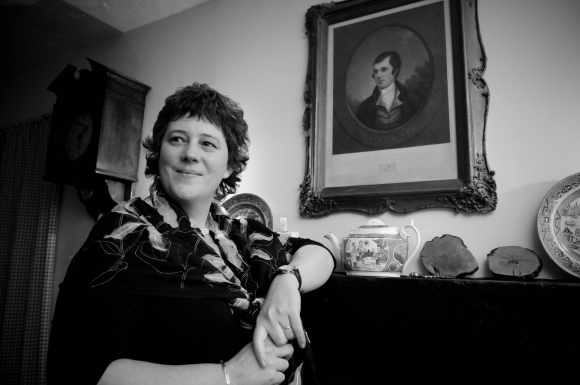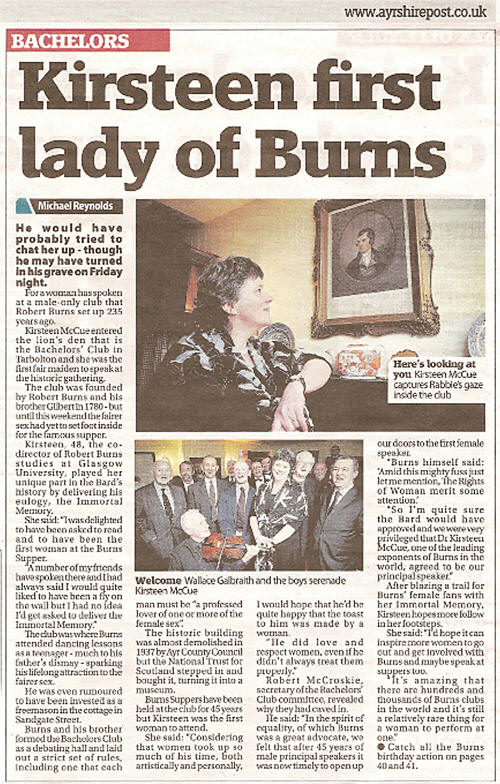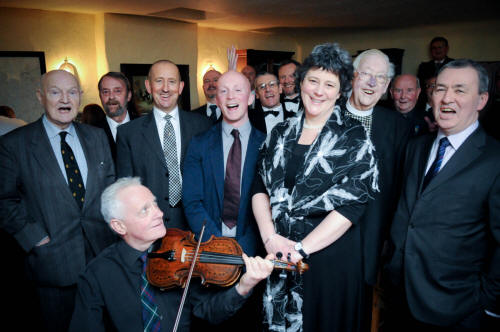|
Edited by Frank R. Shaw, FSA Scot, Greater Atlanta, GA, USA
Email: jurascot@earthlink.net
This is what I would call
a scoop! I asked and she responded - affirmatively - if she would write
an article on her recent delivery of the Immortal Memory at an all-male
Burns club, one that was actually founded by Robert Burns, his brother
Gilbert and a few of their acquaintances. Her “yes” reply was immortal
to me. You see, I have a lot of pull in her home beginning with son
Gregor who has had his own Immortal Memory published on Robert Burns
Lives! for several years now and is the youngest person to ever present
an Immortal Memory on RBL! Her daughter Dora and husband David are my
friends as well, wonderful people. More importantly, or at least just as
important, their loving dog Winnie is on my side too! Who could I be
talking about other than the first woman to ever address an Immortal
Memory at the famous, or infamous, Tarbolton Bachelor’s Club. There has
been much publicity in the press on her the last couple of weeks and,
hopefully, we will be able to entice her to speak to my own Burns Club
in Atlanta one day. This talented speaker is also a singer and musician
with enough academic degrees to make a lot of would-be Burnsian scholars
blush. Allow me to introduce my good friend, Dr. Kirsteen McCue of
Glasgow University and its Centre for Robert Burns Studies, and Sunday
lunch chef extraordinaire!
Kirsteen has given many interviews on radio and television regarding her
Tarbolton experience, but this is the first article by her personally.
That is where the scoop comes in and I am extremely proud that her views
are expressed on Robert Burns LivesI I look forward to smoking a Boston
butt for six or seven on the grill for this delightful young family when
they visit us in the States, hopefully sooner rather than later. My
deepest thanks to her for sharing her thoughts with us.
Next week I look forward to bringing you various newspaper accounts of
Kirsteen’s time at Tarbolton. (FRS: 2.10.15)
Burns and the Bachelors
By Kirsteen McCue, University of Glasgow

Kirsteen McCue at the Bachelors Club
There’s been a bit of a
‘stooshie’ here in the past couple of weeks. Not only has it been Burns
season, with its late nights, revelry and celebrations both traditional
and avant garde, but my invitation to deliver the Immortal Memory at the
Tarbolton Bachelor’s Club has generated serious comment. There’s been
coverage on BBC Scotland (both radio and TV -
http://www.bbc.co.uk/news/uk-scotland-glasgow-west-30948428), on
Scottish Television’s news programme (http://news.stv.tv/scotland/307727-dr-kirsteen-mccue-makes-history-at-bachelors-club-burns-supper/)
and in The Times, as well as a variety of Ayrshire papers and brief
reports in The Herald and The Scotsman. And why? For no other reason,
but that I am of the fairer sex.
The Tarbolton Bachelor’s
Club, formed by Burns and his brother Gilbert in 1780, was exclusively,
as its title suggests, for Bachelors – indeed it was for young, working
men in Tarbolton and its environs. Nigel Leask’s recently published
first volume of the new Oxford Works of Robert Burns, entitled
Commonplace Books, Tour Journals and Miscellaneous Prose (2014),
includes the formal documentation from the Club, replicating the
information as it appeared in James Currie’s first edition of Burns’s
works in 1800, because the original papers had been destroyed. One of
the most impressive things about the young Burns brothers is that they
were clearly well engaged with the world around them and, although it
was not overly common for small rural towns like Tarbolton to have clubs
of this kind, it was nonetheless the case that there was a real vogue
for clubs and societies across the British Isles and beyond. Young men
were eager to improve themselves and often joined Masonic lodges and
clubs (and there were two in Tarbolton at this time) to expand their
social networks while broadening their knowledge too. As Nigel has
commented, Tarbolton’s population was in decline at this point, but
young unmarried men nonetheless represented a high percentage of this
population.

Article from the Ayrshire Post Newspaper
Women were not normally
allowed access to such clubs and societies with the exception of special
evenings. Again in this context the Bachelor’s Club was no different,
for women were allowed access on the occasion of the Club’s annual
dance. There was little space for a big gathering in any case. The Club
meetings were held in a single upstairs room above a domestic dwelling –
in a building erected in the 17th century. In Burns’s day the
ground-level house was occupied by John Richard and his family – various
accounts suggest it was an alehouse. Club membership was limited to a
maximum of 16 men (there are only 6 today!) and by the time each of them
had arrived with a partner and dancing was underway there would be
little space for anyone else. But women, as I reminded the men gathered
at our dinner on 23rd January 2015, played a significant role in the
background. The ‘History of the Rise, Proceedings and Regulations of the
Bachelor’s Club’ states quite clearly, in its 10th Regulation’ that:
Every man proper for a member of this Society, must have a frank,
honest, open heart; above any thing dirty or mean; and must be a
professed lover of one or more of the female sex.
I did dare to pose the question ‘is this still the case?’ at the dinner
– but no one responded! The Rules continued, by stating that
No haughty, self-conceited person, who looks upon himself as superior to
the rest of the Club, and especially no mean-spirited, worldly mortal,
whose only will is to heap up money, shall upon any pretence whatever be
admitted. In short, the proper person for this Society is, a cheerful,
honest-hearted lad; who, if he has a friend that it true, and a mistress
that is kind, and as much wealth as genteely to make both ends meet – is
just as happy as the world can make him.
In my Immortal Memory I noted that, while Burns perhaps didn’t
completely fulfil this remit by the time of his untimely death, at the
age of 21 when he formed the Club he doubtless was an ‘honest-hearted
lad’. What was certainly true was that he had a formidable knowledge of
local women as his song ‘The Tarbolton Lassies’ testifies. And,
moreover, his first question for discussion and debate clearly
illustrated his ability to tick this particular membership box:
Suppose a young man, bred a farmer, but without any fortune, has it in
his power to marry either of two women, the one a girl of large fortune,
but neither handsome in person, nor agreeable in conversation, but who
can manage the household affairs of a farm well enough; the other of
them a girl every way agreeable in person, conversation and behaviour,
but without any fortune: which of them shall he choose?
Sadly, as the account we do have suggests it was a vital and vibrant
social and intellectual development in the area, the Club only lasted
for a few years beyond the departure of the Burns brothers when their
father died in 1784. They took the tenancy on Mossgiel farm and became
connected to the town of Mauchline at this point. Here they quickly
became founding members of the ‘Mauchline Conversation Club’, as it was
termed, which was not quite the same as the Bachelor’s Club – they
started a subscription book club over and above the debating. While John
Richard’s house remained intact, it would be well into the 20th century
before a new ‘Bachelor’s Club’ met again in that room. In the interim
several families occupied the house, but by the 1930s it was facing
demolition when the National Trust for Scotland stepped in. It was
eventually opened to the public in 1971 and now you can go and visit it
and learn from the wonderful Davie Rodger, who looks after it and is a
font of knowledge about Burns and his connections there. His amazing
commitment to the place was rightly commended by several of our
toastmasters at the dinner this January.
But to our tale...
The story goes that I received an initial invitation from Dr David
Hopes, Director of the Robert Burns Birthplace Museum in Alloway and on
behalf of the National Trust for Scotland in September last year
sounding me out as to whether I would attend as the first woman to be
invited to the Club. I was really delighted to receive this invitation.
I knew some male friends and colleagues who had been invited to attend
and speak in the past and was always keen to know what it had felt like
to be there. I was happy to say yes, partly because I knew it was ‘a
first’, but also because I have a real soft spot for this particular
venue. Along with Ellisland, Burns’s last working farm, my trip to the
Bachelor’s Club several years ago sticks in my mind because it has
hardly changed since Burns himself was there. Just a single room, with a
thatched roof and an outside stair as entrance, you do feel as though
you step back in time when you enter it. Initially invited to attend and
to reply to one of the evening’s many toasts (very 18th century!) the
invitation, by mid December, had changed and I was asked if I would be
willing to propose the main toast of the evening, to the Immortal Memory
of Burns. As most folks know this is the main speech at a Burns Supper
and nearly always the focus on Burns himself. I really felt a sense of
expectation, but I did also want to accept.
So on a cold, rainy and windy January evening I made my way to Ayrshire
as night came. The day had been outrageous. The National Trust for
Scotland had prepared a brief press release about the occasion, but no
one quite believed how much attention this would generate. I woke to my
husband, leaving for work at 7.15, telling me I’d just been ‘on the
radio’ and by my breakfast time my mother had heard news of the event on
the morning television news. The phone didn’t stop and I gave interviews
to The Times, The Ayrshire Post and received STV to my home to interview
me for the evening news. They were on their way to Tarbolton to speak to
David Hopes and take some footage of the Club itself. The locals in
Tarbolton couldn’t quite believe it, as we were later to find out. And
across 24 hours I had messages from friends and colleagues literally
across the world who’d picked up the information on Scottish news
websites.
In the company of my
drouthy cronies – David Hopes and Chris Waddell from the Burns
Birthplace Museum, and their guest Graham Boxer, Director of the
Imperial War Museum, North – we taxied from Ayr to Tarbolton where we
were met by a crowded room of ‘Bachelors’ and the catering crew who were
working tidily in one corner of the room (the food was delicious). Davie
Rodger had told me before about how the room had been ‘shored up’ from
below. But last year they had new joists put in and everything in the
Richard house had a lick of paint! Nonetheless the tables were laid and
the space was tight, made more so by the appearance of two local
photographers who then had us work our way around the space for a
variety of different shots. Folks were mightily relieved when that part
was over and we were asked to sit for dinner.
In such a tight space there was a real intimacy about the evening.
Conversation was always on the go. I was happily sitting between Graham
Boxer and the Reverend Ian Macdonald, now, I think, the most senior
member of the Club, who chaired the evening with dry wit and great
timing. It transpired that he and I had a love of Ardnamurchan in
common, he having been born in Kilchoan about four miles from the place
my own family visits every summer. But the tables are so closely
connected that there was also conversation with other guests. The
evening does not conform to the usual Burns Supper schedule. We did have
‘The Selkirk Grace’ and the Haggis was piped in and ‘addressed’. But
there was no toast to the lassies, of course, and no reply! There were
six other toasts, including the Immortal Memory, and replies to each of
these which really harked back to the 18th century vogue for toasting
and for using toasts to educate those who were present. So we ‘learnt’
about the work of the National Trust for Scotland, about the Birthplace
Museum and more about the workings of the Bachelor’s Club meetings
nowadays too – this was the funniest moment of the evening with comic
banter between David Hopes and the Club secretary Bobby McCroskie. And
we did have some poems – with an especially breathless and exhilarating
‘Tam o’Shanter’ and a couple of songs by the newest Club member, Bruce
Kennedy. Moreover we heard the ornately decorated William Gregg fiddle
played by local Ayrshire fiddler Wallace Galbraith
(http://www.burnsmuseum.org.uk/collections/object_detail/97.90.0).
This is the fiddle to
which Robert and Gilbert learnt to dance while they attended the Club
meetings and which, presumably, played for the dances which the local
lassies were asked to attend (if they were so lucky!). What came across
for me was a real passion for and knowledge about Burns. It shone
through all contributions. So often Burns suppers can be huge and rather
impersonal events, but this was at the opposite end of the spectrum.
I had been slightly anxious that not all attendees would have been
supportive of the Club’s invitation to me to speak. But, if there were
reservations, they certainly didn’t show them. I was warmly welcomed and
respectfully treated and I was particularly touched to be introduced by
the Reverend Macdonald not as ‘the first woman to attend and speak’ but
as someone who was doing interesting work on Robert Burns. My Immortal
Memory explored the question of whether or not Burns would have been in
agreement with my invitation to deliver his toast and, by using a number
of the love songs to make my point, I explored Burns’s relationships
with women and what this told us. I concluded that, even though he
didn’t always do the right thing by his women, he was well aware of the
need for women’s rights to be heard and respected. Burns’s impressive
ability to ‘voice’ a wide range of women and their views in his poems
and notably his songs clearly demonstrates this. As such I concluded
that he really wouldn’t have minded that his own toast was proposed by
one of that sex who, after all, occupied so much of his creative time as
well as his physical life.
So I hope my decision to accept the Bachelors’ very kind and bold
invitation has been a positive move. The Immortal Memory is still rarely
proposed by a woman, but there are plenty of women with real interest in
and knowledge of Burns in the 21st century. I do feel privileged to be
the first to have been asked to this very special place and proud to
have made a little bit of history this January. When we walked to the
local ‘Black Bull’ for a final dram that evening we were met by a young
man, not that dissimilar to Burns – a local stonemason in his twenties –
not that much older than Robert and Gilbert were when they formed the
club. He got chatting to Chris Waddell who explained that he’d been in
Tarbolton that evening for the Bachelor’s Club supper. ‘Where’s the
wumman and can I meet her?’ was the question. I was duly introduced and
regaled by his own performances of Burns. The folks in the pub that
night had all heard mention of Tarbolton that day on the news and were
well impressed by it. Their warm welcome and their love of Burns will
mean that I won’t forget this Burns Supper for many years to come.

Kirsteen McCue with Members of the Bachelors Club
If you get the chance go and visit the Bachelor’s Club
http://www.nts.org.uk/Property/Bachelors-Club/
|

